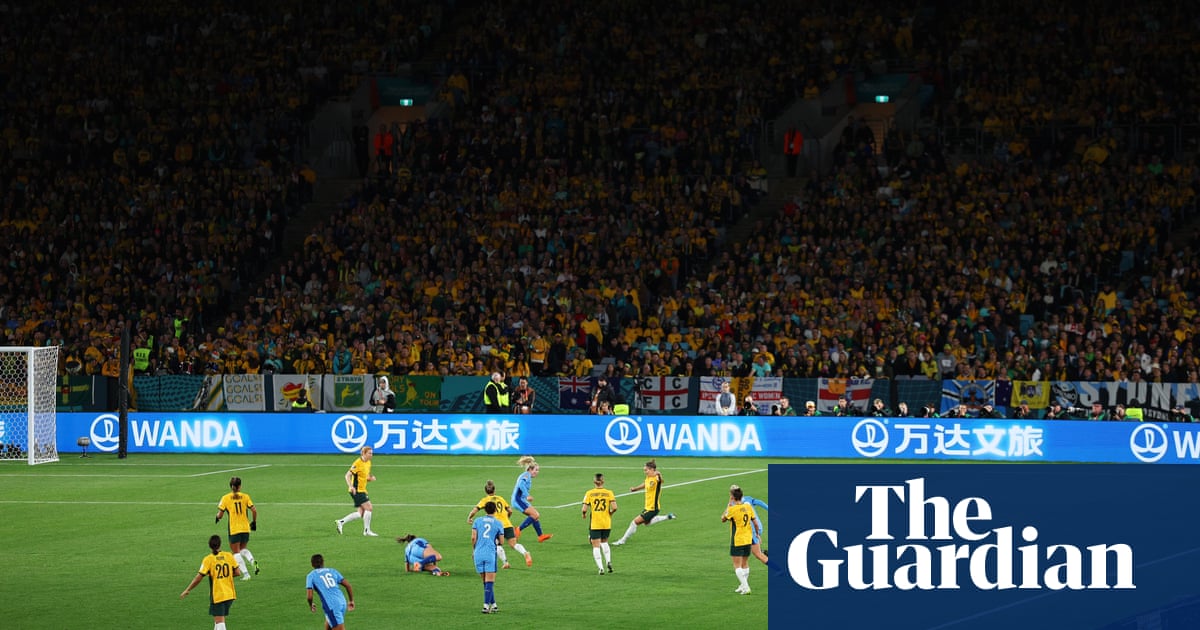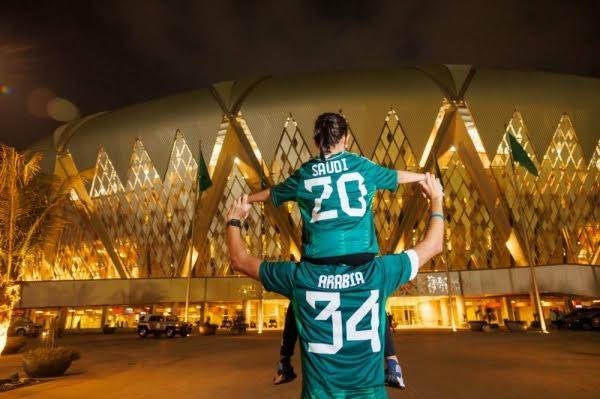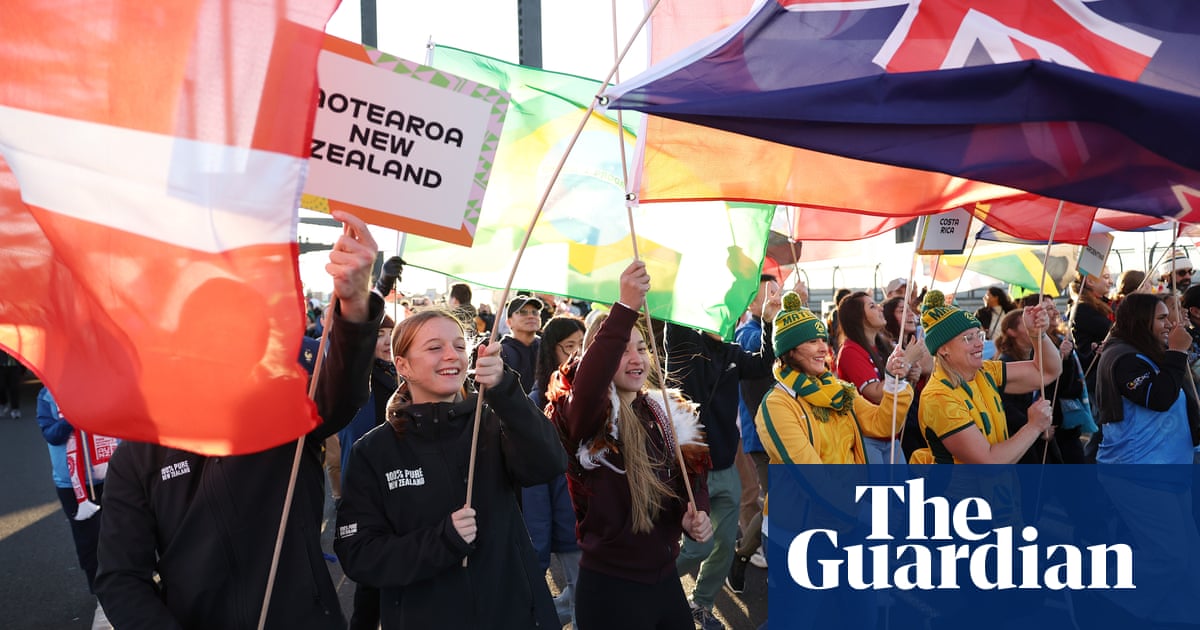
A highly improbable upset. A fluke. Steven Bradbury, back for more. That’s the short explanation of what might lead to Australia hosting the men’s football World Cup in 2034.
So onerous are the hosting requirements. So influential, so well resourced is the opposition. So vast are the impracticalities, so tenuous the political support. So … you’re saying there’s a chance?
If the unsuccessful bid for the 2022 World Cup – at a cost of $46m in taxpayer funding – was a bad decision, many will say a campaign for 2034 is worse. But to the longsuffering Australian football fan, still delirious from the highs of the Women’s World Cup, self-sabotage and hope are strange bedfellows. And until Australia officially stops “exploring the possibility” of a bid, the possibility remains.
What would it actually take? Help, in the first instance. This year’s Women’s World Cup wouldn’t have landed in Australia without the assistance – and the geographic legitimacy – of co-host New Zealand. That tournament was the first time countries in different confederations hosted a World Cup.
But the 2023 event is dwarfed by the ever-growing men’s showpiece, which now involves 48 teams. This year’s women’s tournament required 10 stadiums. Fifa’s bidding documents require 14 for the 2034 event. And they need to be bigger: 40,000 capacity at a minimum.
In theory, Australia could cobble together 10 that meet the size requirement, 11 if the ACT increased the capacity of its planned stadium. But that lineup is unrealistic. It would leave the NRL and AFL without major venues for their competitions. Negotiations in 2009 between football officials and the domestic codes over access and compensation for the 2022 bid was tense and often played out through the media. At least two locations would be struck off the list.
Even if access was granted, Australia’s stadiums threaten to underwhelm Fifa’s inspectors – the oval arenas fall foul of strict requirements around sight-lines. Former Victorian premier Daniel Andrews said in August the MCG could be made rectangular. But such a renovation would be likely to cost hundreds of millions of dollars, and construction would further limit cricket and AFL’s calendar.
Across the ditch, Eden Park is the only stadium with a capacity of 40,000. Fifa’s regulations require any country in a bid to offer up two complying arenas. Even if New Zealand is to be involved, ground must be broken.
To address the shortfall in suitable venues, a joint bid with at least one Asian co-host has been touted. In August, Football Australia’s chief executive, James Johnson, said negotiations with potential partners would have to go through the federal government, and at that stage “nothing specific” around a World Cup bid had been raised.
That’s a problem because Australia is short of time. While completed bid proposals are not expected until July next year, Fifa’s form for member associations to lodge their interest is due in three weeks. It requires them to state whether they are preparing a joint bid, and with which other associations.
Such a tight timeline necessitates swift action. But Canberra shows no sign of urgency. A spokesperson for the Australian government said it was “a decision for Football Australia”. New Zealand’s sport minister, Grant Robertson, said it was up to NZ Football to decide whether or not to bid, and “this process has not started yet.”
The process may not have started in New Zealand, but it certainly has in Saudi Arabia. The wealthy west Asian nation has invested billions of dollars into sport in recent years. The country secured a Formula One race in 2021, and its Public Investment Fund (PIF) provided financial backing to Liv’s shake-up of the world golfing order. But its most prominent investments have been in football.
Within hours of Fifa opening the bidding for the 2034 tournament last week, Saudi Arabia had declared its interest. PIF has a majority stake in Newcastle United in the English Premier League. Teams in the Saudi Pro League have signed stars like Karim Benzema, N’Golo Kanté and Jordan Henderson. And the country is building three new stadiums and substantially upgrading another three ahead of the Asian Cup in 2027. The 2034 World Cup appears to be the endgame.
These investments have drawn accusations of “sportswashing” amid outcry over the country’s human rights record. To some, Saudi Arabia must answer for much: the killing of journalist Jamal Khashoggi, the war in Yemen, inequality around the rights of women. But for many, like some football supporters in northern England, or thirsty golf fans in Adelaide, the Saudi influence has been a good thing.
Football’s politicians appear to be of a similar mind. The head of the Asian Football Confederation, Sheikh Salman bin Ibrahim Al Khalifa, who is also the Fifa Council’s senior vice-president, said he was “delighted” with the news of the Saudi bid. Footballing bodies in Egypt and Nigeria have expressed statements of support, and the bloc is likely to grow. Saudi Arabia has recently signed memorandums of understanding with the confederations of Africa and Oceania, and individual associations China, India, Iran, Iraq, Costa Rica, Singapore, Syria, Sudan, Kuwait, Brunei, Comoros, Ghana and Ecuador.
Given this, it’s no surprise the entire Fifa congress – more than 200 representatives – will be asked late next year to decide the 2034 host. Saudi Arabia is the clear favourite, with widespread support. And at this stage, the only bidder.
There follows a discomforting thought. A sophisticated, innovative, downright impressive Australian bid – delivered miraculously in time, and with novel partners – can only do so much. Even to participate is to endorse this reality. That much was learned when Qatar won the right to host 2022.
But maybe, by late next year, the world has changed. Perhaps Saudi Arabia’s manoeuvring produced a tactical misstep. Its investment rejected. Its alleged indiscretions re-prosecuted or – even worse – revisited. Its standing among the international community having slipped.
That narrow, fanciful path offers a possibility for Australia. At the mercy of the world’s whims. Mostly without agency. Yet, if the country dares enter, relying on one precious thing. Football, despite Fifa, does love an upset.












